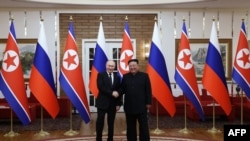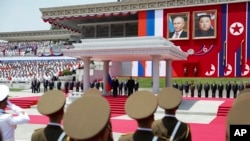Russian President Vladimir Putin received a grandiose reception in Pyongyang on Wednesday, meeting North Korean leader Kim Jong Un and pledging closer cooperation as both countries confront the West.
Putin and Kim, who also signed a document upgrading ties, participated in a welcoming ceremony in the central Kim Il Sung Square, where buildings were draped in massive Russian and North Korean flags and portraits of the two leaders.
North Korean residents dressed in red, white, and blue shirts waved bright bouquets of flowers in unison as a brass band played patriotic songs. Putin and Kim also observed a North Korean honor guard before departing for negotiations, which included two hours of one-on-one talks, according to Russian media.
At the outset of the negotiations, Putin thanked North Korea for its “consistent and unwavering support” for Russian policy, including in Ukraine, reported Russia’s Interfax news agency.
Kim expressed his “full support and solidarity” for what he called Russia’s “special military operation” in Ukraine, according to Interfax. The North Korean leader also vowed to “unconditionally support” Russia’s policies, the agency added.
Putin, who is making his first visit to North Korea in 24 years, invited Kim to Moscow, Russian state media reported.
Russia and North Korea have long been close partners, but their cooperation has intensified following Russia’s 2022 invasion of Ukraine. North Korea has supplied Russia with thousands of containers of munitions, including ballistic missiles, according to U.S. officials – an allegation denied by Pyongyang and Moscow.
Close, but how close?
According to Interfax, Putin and Kim signed a comprehensive strategic partnership treaty, formally upgrading ties. The treaty text has not been released. Though it is expected to fall short of a formal alliance agreement, Russian officials have said it will likely cover defense cooperation in some sense.
Analysts debate how far North Korea-Russia military cooperation will go. Some say Kim and Putin may find more reasons to continue working together as each country’s relationship with the West deteriorates. But the two men will not restore Soviet-era ties, said Kim Gunn, a South Korean lawmaker who earlier this year stepped down as South Korea’s top nuclear envoy.
“Russia is not the former Soviet Union,” he said. “And Russia is at war in Ukraine – they are pouring all their energy into this war. There’s not so much room for Russia to do anything with North Korea.”
For now, Putin and Kim are presenting a united front, with Putin describing their collaboration on Wednesday as a fight against U.S. hegemony.
An editorial Tuesday in the Rodong Sinmun, North Korea’s main newspaper, said the “people and military of both countries have the sacred duty, together, to safeguard their country’s sovereignty and dignity and guarantee the peace and security of the region.”
Rachel Minyoung Lee, a North Korea watcher and senior fellow at the Washington-based Stimson Center, said that formulation was unusual for North Korean state media, an aberration that she said sends a “less than comforting message” about future military cooperation.
“The agreement (or a treaty) North Korea and Russia sign during Putin’s visit, if made public, will hopefully bring clarity to this phrase,” she wrote in a blog post on 38 North, a North Korea-focused website.
Sanctions evasion
Tuesday, Putin vowed to work with North Korea to counter sanctions. In a letter published in North Korean state media, Putin said the two countries would develop trade mechanisms “not controlled by the West” and would “jointly oppose illegitimate unilateral restrictions.”
Both countries are subject to a growing number of sanctions imposed by individual countries – Russia because of its invasion of Ukraine and North Korea because of its nuclear weapons program and other illicit activities, such as cybertheft.
North Korea is also subject to a series of United Nations Security Council resolutions, which prohibit a wide range of economic activity with Pyongyang.
Russia – a permanent, veto-wielding member of the U.N. Security Council – voted for the North Korea sanctions as recently as 2017. But it now opposes the sanctions and has taken steps to complicate their enforcement.
Many Russian analysts say Putin is reluctant to completely abandon U.N. sanctions on North Korea. Instead, he may search for what he sees as loopholes that facilitate cooperation even in areas that are subject to U.N. sanctions, such as North Korean laborers earning income abroad.
For instance, North Korean IT specialists could work remotely from their home country without technically receiving income abroad, said Georgy Toloraya, a former member of the U.N. Panel of Experts, which was meant to monitor enforcement of the North Korea sanctions.
Weapons cooperation
Analysts are also watching Putin’s visit for any signs of additional defense cooperation.
A key question among Western analysts is what Putin might offer North Korea in exchange for weapons allegedly used in the Ukraine war.
U.S. officials have expressed concern that Russia may provide North Korea with advanced weapons or other assistance related to its nuclear program.
Such cooperation represents “the greatest threat to U.S. national security since the Korean War,” said Victor Cha, the Korea Chair at the Center for Strategic and International Studies.
In a blog post, Cha said it is “highly unlikely that Kim would have feted Putin so lavishly only for the promise of food and fuel,” noting that Pyongyang seeks advanced weapons, including nuclear submarine and intercontinental ballistic missile technology.
“This aspect of the relationship not only destabilizes security on the peninsula and in Asia; it also heightens the direct threat posed by North Korea to the [U.S.] homeland,” he said.






